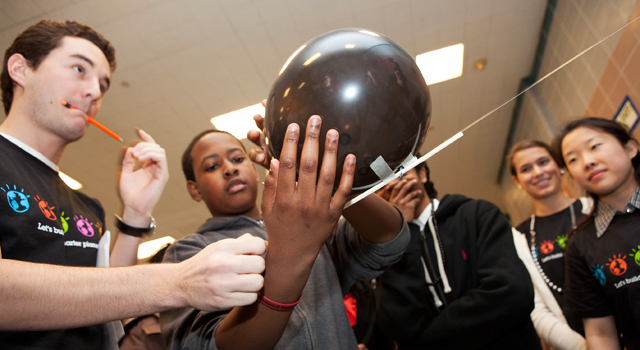Tech giants are teaming up with public schools to give kids a path to science jobs.
 Rethinking Vo-Tech: Each of the 19 teams sketched, assembled, and launched balloon-propelled rockets. Whenever a flight was successful, there was revelry. LAUNCH SLIDESHOW >Photographs by Rebecca Greenfield
Rethinking Vo-Tech: Each of the 19 teams sketched, assembled, and launched balloon-propelled rockets. Whenever a flight was successful, there was revelry. LAUNCH SLIDESHOW >Photographs by Rebecca Greenfield Excited students bubble into the basement cafeteria of a Brooklyn, New York, high school, both sexes favoring thick-framed geek-chic glasses--fitting for a school in which geek is very chic. The kids have gathered this Friday morning for a competition: They must design drinking-straw "rockets" that can traverse a fishing line using only balloons for propulsion. But the jerry-rigged shuttles aren't the only models being evaluated. The school itself is an experiment, one intended to prepare average urban students for entry-level tech jobs. If the rockets work out, the winning team will get iTunes gift cards. If the school succeeds, it could help fill 14 million science, tech, engineering, and math (STEM) jobs over the next decade.
Pathways in Technology Early College High School (P-TECH) opened in September 2011, the brainchild of Stan Litow, president of the IBM Foundation and former deputy chancellor of New York public schools. "The question was, what can schools do to connect more directly to jobs?" says Litow. The answer: Tap IBM and the New York City College of Technology to create a collaboration-oriented curriculum that enables students to graduate in six years with an associate degree in applied science and a spot "at the head of the line" for entry-level IBM tech jobs. To enroll, students need only attend an orientation session.
"The QUESTION WAS, WHAT CAN SCHOOLS DO TO CONNECT MORE DIRECTLY TO JOBS?"
The arrangement is shades of vo-tech, which is generally looked down on by Americans who resist the idea of "tracking" low-income students into sub-BA programs. But P-TECH's principal, Rashid Davis, argues that working toward a goal keeps students motivated and more likely to earn a four-year degree down the road. Research on so-called career academies by policy group MRDC bears this out.
"We push them hard," says Chris Leung, who teaches technology, one of five first-year classes (along with math, English, workplace skills, and phys ed). Fifteen-year-old Ibrahim Wright agrees. "I was a C student before. But here, you can't be lazy." Not that the students have to go it alone: Part of IBM's involvement is to provide mentors.
So far, early returns are promising. After only one term of ninth grade, 89% of P-TECHers meet N.Y.C. standards for promotion to 10th, compared with the citywide year-end average of about 70%. Down in P-TECH's caf, one team designs, redesigns, and tests its rocket three times in a matter of minutes en route to a close win and iTunes riches. The P-TECH model is iterating at similar speed. This year, three more schools will open in New York, and Mayor Rahm Emanuel has fast-tracked five in Chicago, with Cisco, Microsoft, Motorola, and Verizon joining IBM as partners. The rocket is on the fishing line; with balloons of that ilk behind it, there's no telling how high it can go.
A version of this article appears in the June 2012 issue of Fast Company.
DIGITAL JUICE
No comments:
Post a Comment
Thank's!